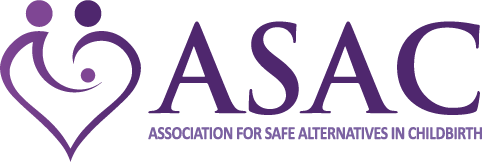
How to report a traumatic birth experience
After the CBC National coverage of Canadian’s experiences with traumatic births, which was released at the end of last year in Annie Burns-Pieper’s article, “’Stop! Stop!’: Canadian women share stories of alleged mistreatment in the delivery room1,” it has become clear to ASAC that mistreatment in childbirth is largely under reported. The Society of Obstetricians and Gynecology of Canada (SOGC) CEO, Jennifer Blake, was mentioned in Burns-Pieper’s article as not being aware of issues of abuse and mistreatment. This is shocking to us at ASAC as we have been occasionally publishing these stories for nearly 40 years. It also directly contradicts CBC Calgary’s more recent article entitled, “Alberta women 2½ times more likely to suffer physical trauma from childbirth than OECD average, study says2,” which reported on a new study by the Canadian Institute for Health Information (CIHI)3.
“ASAC fully believes that your contribution can be the foundation for change within the Alberta health care system,” Dana Weatherhead, President of ASAC.
ASAC encourages parents to speak up about traumatic birth experiences. The first step is always to speak directly to your care providers. There are times when simply pointing out how a birthing client and support people have been made to feel can be very revealing and eye-opening to the birth team. There may also be times when the relationship has been damaged by a traumatic experience or when the trust was never established in the first place. In this case it can be difficult to express your feelings without feeling judgement or disapproval.
Some people may be worried that if they report a bad experience it may affect their current or future care. Alberta legislation is in place to uphold a patient’s right to express their complaints with health services. The Patient Concerns Resolution Process Regulation (Alberta Regulation 124/2006) requires Alberta Health Services to appoint a Patient Concerns Officer whose department is responsible for receiving, investigating and responding to complaints regarding health services, or other support services, provided to patients4.
Steps for reporting your experience
The first step in the reporting process after discussing your concern with your care provider, when appropriate, is to contact the
Patient Relations Department.
Telephone: 1-855-550-2555, Fax: 1-877-871-4340
Mail: Patient Concerns Officer and Executive Director, Patient Relations
\Suite 300, North Tower, 10030 107 St, Edmonton, AB, T5J 3E3
You can complete an online patient feedback form here.
If your complaint cannot be resolved through your care provider or Patient Relations the next step is to call the Alberta Health Advocate: 780-422-1812. The Alberta Health Advocate combines the offices of health, mental services, and seniors. It is able to help people navigate the complaints process and steer you towards the appropriate reporting channels to resolve your concern.
If the complaint deals with competency or conduct of a care provider report the individual directly to their governing body, listed below. This may include rude remarks, bullying or fearmongering, not providing full discussion of risks and benefits, performing actions without consent, or physically moving or restraining a body against one’s wishes.
College of Physicians and Surgeons of Alberta
College and Association of Registered Nurses of Alberta
Registrar at the College of Midwives of Alberta
Telephone: 403-474-3999 Email: registrar at albertamidwives.org
Office: 119E 1144 29 Ave NE, Calgary AB T2E 7P1
Click here for complaint form
Sometimes a complaint may have to do with the safety of a drug that was given to you during labour. These may include such scenarios as having a prostaglandin induction recommended due to a previous caesarean, or a Pitocin augmentation used for a slow labour that later resulted in fetal distress. In these, or similar, cases you can file a Health Product Complaint.
Other drug related complaints deal with adverse side effects to something administered during birth, for example a painful and intense reaction to a prostaglandin gel, which would generally be considered a mild induction method.
In this case contact Canada Vigilance Regional Office
You can find the instructions for reporting an adverse side effect here.
Find the online reporting form here
Download and print the Side Effect Reporting form here
Mail it to a Canada Vigilance Regional Office:
Canada Vigilance Regional Office – Alberta, Northwest Territories and Yukon
Health Canada
Suite 730, 9700 Jasper Avenue
Edmonton, Alberta
T5J 4C3
Telephone: 1-866-234-2345 or Fax: 1-866-678-6789
You can also request a form and a postage paid envelope be sent to you by calling the above number, or print a postage paid label to send your forms in the mail for free
If you are unhappy with the fairness of how your complaint was handled, or felt the follow-up to your claim was inappropriate or lacking you should contact the Alberta Ombudsman at 780-427-2756 or 403-297-6185
Other contacts to escalate your report, when needed:
Health Quality Council of Alberta
Alberta Health
Healing and moving forward
One way we can begin to move forward from our traumatic births, individually and as a society, is to tell our stories: honour them and allow them to inform, teach and guide us. Through the work of editing birth stories with Birth Issues our community has seen many stories, and people, transform through the telling of their birth stories. A strength comes into their voices with understanding why certain procedures and events may have occurred or admitting how they were personally affected. Rarely does that understanding equate to acceptance, instead it often ignites a fire within them and sometimes pushes them to encourage others not to accept the same outcomes. Let us take what we have learned, take the strength we have gained as parents and push forward for positive change in Alberta birth: for our own children and the many people that will birth before, and after, them.
Therefore, please consider writing an open and honest account of how your birth went and how it made you feel. Share your traumatic stories with the SOGC, our MLAs, Ministries for Health, Culture, Multiculturalism, and the Status of Women, and our Premier; make them care about the issue. Please include any details you have such as the name of the hospital you gave birth at, the date you gave birth, the attending physician’s name, as well as the names of any other staff members involved. Be specific with where you felt care could have been improved, and how. Share your positive stories too and let them see the value to respectful, people-centered, care.
“I think it is really important for people to continue writing letters. The Health Disciplines Board has been flooded with letters and it has really made a big difference to what is happening with the legalization process5,” Noreen Walker.
You can look up ASAC’s Maternity Care in Alberta Report6 for the most recently published Alberta maternity statistics to back up your personal experience, or add the link itself into your letter to help encourage our physicians, nurses, and Members of Legislature to keep reading the most up to date facts about treatment in childbirth and the financial savings available to our government.
Keep talking about birth. Talk to your friends and family members, talk to our care providers, politicians and post on social media. Talk about birth and Alberta’s maternity needs; just keep the conversation going.
To make a complaint to the SOGC
After the CBC National coverage it has become clear to ASAC that the SOGC is not aware of the abuse we have heard stories of through our publication of Birth Issues and during the recent media campaigns #mybabymybirth and #MistreatedInChildbirth.
In addition to sending the SOGC your personal birth story, you may want to consider sending them a copy of Birth Issues – Maternal mental health: Birth trauma and loss, on stands December 4, 2017. You could highlight the areas that stand out as mistreatment to you, or alternately send in your own birth stories published in past copies of Birth Issues with your story marked and highlighted.
ASAC is committed to change. ASAC encourages anyone who experienced abuse, or mistreatment during their birth to contact Jennifer Blake, CEO of SOGC:
Jennifer Blake CEO
C/O SOGC
780 Echo Drive
Ottawa, ON K1S 5R7
or email her executive assistant at: Aanders@sogc.com
Write to your government representatives
Contact your MLA: You can find your riding here and can find your local MLA here.
Premier: The Honourable Jason Kenney
Inside Edmonton: 780-427-2251 Outside Edmonton: 310-0000-780-427-2711
Use 310-0000 before the area code and number to avoid long distance calling to government offices.
Email: premier@gov.ab.ca
Office of the Premier: 307 Legislature Building, 10800 – 97 Avenue, Edmonton, Alberta T5K 2B6
Health ministers:
The Honourable Tyler Shandro – Health Minister
Phone: 780-427-3665 Email: health.minister@gov.ab.ca
calgary.acadia@assembly.ab.ca
Facebook: facebook.com/shandro Twitter: @shandro
The Honourable Jason Luan – Associate Minister of Mental Health and Addictions
Phone: 780-427-0165 Email: health.minister@gov.ab.ca
calgary.foothills@assembly.ab.ca
Facebook: facebook.com/jason.luan.1 Twitter: @jasonluan88
Minister for Culture, Multiculturalism and the Status of Women:
The Honourable Leela Aheer
Phone: 780-422-3559 Email: culturetourism.minister@gov.ab.ca
chestermere.strathmore@assembly.ab.ca
Facebook: Leela Sharon Aheer
Twitter: @LeelaAheer
Meet your MLA in person
If you are able, add impact to your request, and story, by meeting with your MLA in person:
1. Call/email/go to your MLA’s office and make an appointment with their assistant.
2. Explain that you would like to meet your MLA to increase access to midwifery care.
3. Mention the names of others who will be part of the meeting. Give their contact info. There is always strength in numbers!
4. Send a follow up email with contact info, time and date of the meeting, and your personal story (in an attached document).
5. When writing your story, include your address, date, caregiver’s name, hospital name and the details of the birth. Write a paragraph that outlines what you suffered through, or how midwifery care made a difference to you, and another explaining what your solutions would be. Solutions are important!
7. Always include your phone number, full address and legal name.
8. Provide MLA with a complaint they can act on and solutions that they can use.
“With the help of consumer organizations like Association for Safe Alternatives in Childbirth, midwifery became a legal and recognized profession, finally to be financially supported by our health care system7,” Dr. Benjamin Toane.
Find these MLAs on social media
Tag your local MLAs, the Ministers or the Premier to let them know you have written about maternity care, #ABMidwives or about the #MaternityCareCrisis. Tell them about maternal mental health, birth trauma, the story of #mybabymybirth or how you were #MistreatedInChildbirth. Let them know you are looking forward to your meeting, or how your meeting went. Share your birth pictures with your story briefly captioned. Just keep talk about birth, and make sure to tag ASAC Facebook and Twitter: @ASAC_Childbirth.
Editor’s Notes:
1. Annie Burns-Pieper, “‘Stop! Stop!’: Canadian women share stories of alleged mistreatment in the delivery room,” CBC News, November 7, 2016, accessed November 5, 2017, http://www.cbc.ca/news/health/child-birth-mistreatment-complaints- 1.3834997.
2. Jennifer Lee, “Alberta women 2½ times more likely to suffer physical trauma from childbirth than OECD average, study says,” CBC News Calgary, November 14, 2017, accessed November 15, 2017, http://www.cbc.ca/news/health/child-birth-mistreatment-complaints-1.3834997.
3. “OECD Interactive Tools: International Comparisons,” Canadian Institute for Health Information, accessed on November 15, 2017 https://www.cihi.ca/en/oecd-interactive-tool-international-comparisons.
4. “Patient concerns and feedback,” Alberta Health Services, accessed November 15, 2017, http://www.albertahealthservices.ca/about/patientfeedback.aspx.
5. Horricks, Barb. “Midwife charged: An interview with Noreen Walker.” Birth Issues 7, no. 1, (1991): 3.
6. “Maternity Care in Alberta Report,” Association for Safe Alternatives in Childbirth, (November, 2016), accessed on October 26, 2017, from https://d3n8a8pro7vhmx.cloudfront.net/asac/pages/75/attachments/original/1481648305/Maternity_Care_in_Alberta_Report.pdf?1481648305.
7. Dr. Benjamin Toane’s Eulogy at Noreen Walker’s Celebration of Life, May 7, 2017.

